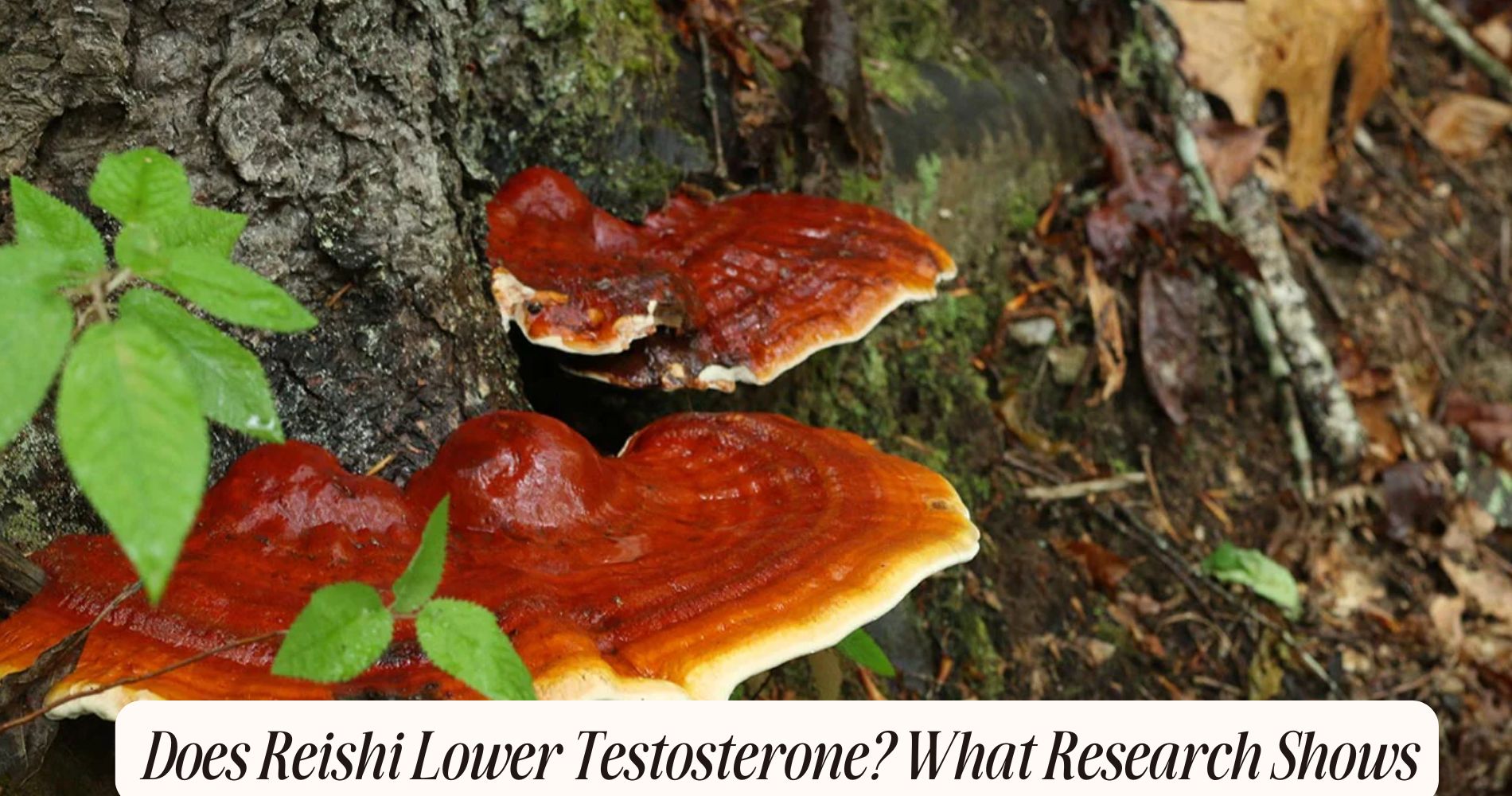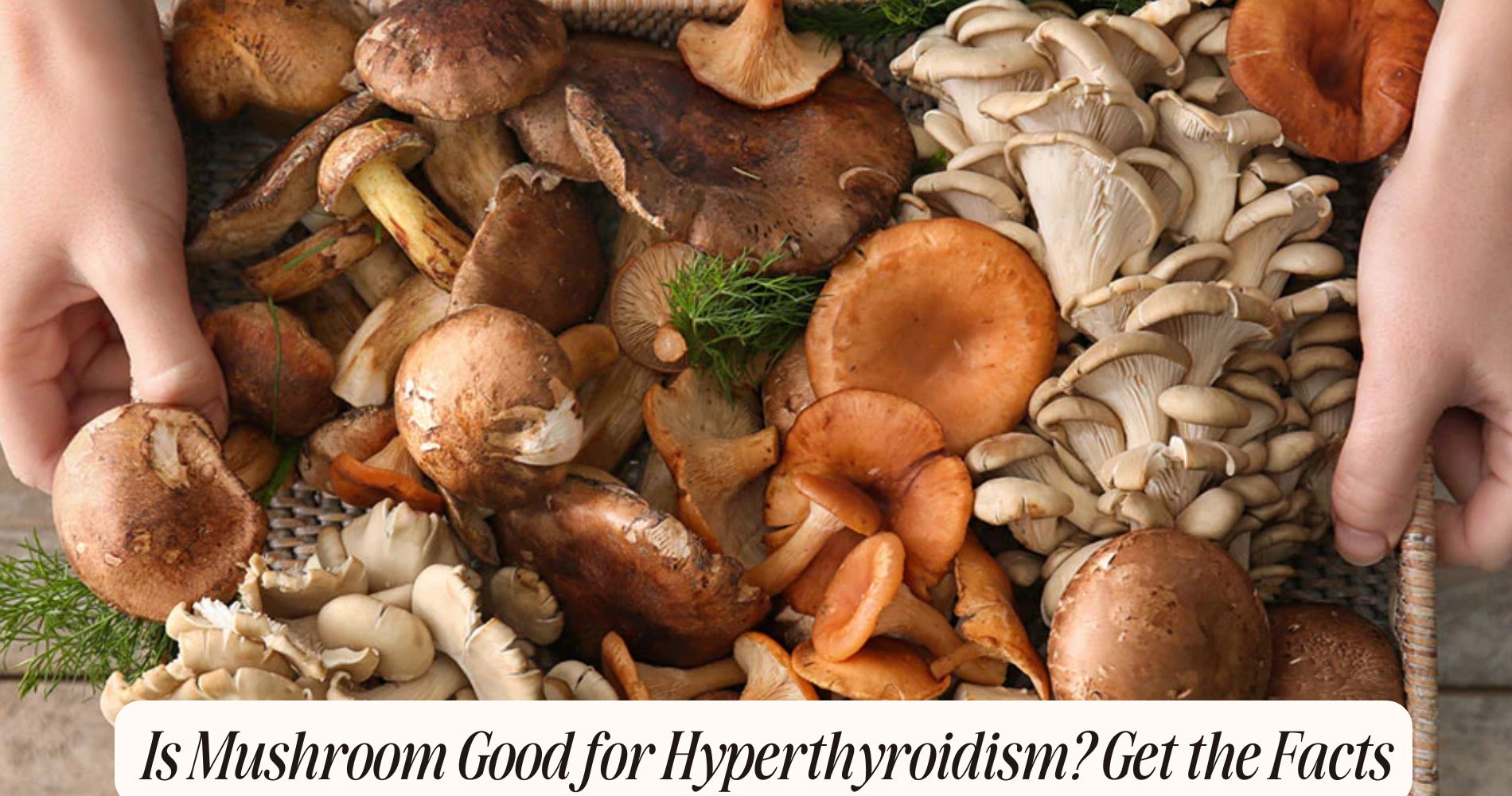
Does Reishi Lower Testosterone? What Research Shows
Does reishi lower testosterone? Reishi mushrooms may affect testosterone levels, with some studies showing a potential decrease in certain doses. High doses, particularly those between 100 to 300 mg/kg, have been linked to lowered testosterone in animal studies. However, other research suggests that Reishi might not greatly impact hormone levels. The effects can vary based on individual responses and dosage. If you're considering Reishi for its health benefits, it's wise to consult a healthcare professional for personalized advice. Understanding these nuances can help you make informed wellness choices, so explore the details further to see how Reishi might fit into your routine.
Overview of Reishi Mushrooms
Reishi mushrooms, often referred to as the "mushroom of immortality," have been used in traditional medicine for centuries, particularly in East Asia. You might find their medicinal properties intriguing, as they're packed with bioactive compounds that contribute to a wide range of health benefits.
These mushrooms contain triterpenes, polysaccharides, and peptidoglycans, which are known to bolster the immune system and reduce inflammation.
Research suggests that reishi mushrooms can help reduce stress and promote better sleep, making them a popular choice for those seeking holistic wellness. Their adaptogenic properties may help your body adapt to stressors, enhancing your overall resilience.

Additionally, studies indicate that these mushrooms may improve cardiovascular health by lowering blood pressure and cholesterol levels.
You'll also appreciate that reishi can support liver function and detoxification, helping your body eliminate harmful substances.
Moreover, the antioxidants found in reishi mushrooms combat oxidative stress, contributing to longevity and energy.
Testosterone: Key Functions in the Body
Testosterone plays an essential role in numerous bodily functions, influencing everything from muscle mass to mood regulation. This hormone, primarily produced in the testes and ovaries, is important for developing and maintaining muscle strength, bone density, and overall physical vigor.
You benefit from adequate testosterone levels, which contribute to improved energy levels, enhanced libido, and better cognitive function.
When testosterone levels are optimal, you're likely to experience a positive mood, increased motivation, and quicker recovery from exercise. However, testosterone deficiency can lead to a range of issues, including fatigue, weight gain, decreased muscle mass, and mood disturbances like depression or irritability.
Understanding testosterone's key functions helps you recognize the significance of maintaining balanced hormone levels. Regular exercise, a healthy diet, and proper sleep can support testosterone production and mitigate the risks associated with deficiency.
If you suspect low testosterone levels, consulting a healthcare professional can provide valuable insights and potential treatment options. By prioritizing your testosterone health, you can access various benefits that enhance your overall quality of life.
Research on Reishi and Testosterone
Reishi mushrooms are known for their potential health benefits, including their influence on hormone levels.
Research suggests that these fungi may impact testosterone production, which could be significant for your overall health.
Understanding this relationship can help you make informed choices about incorporating Reishi into your wellness routine.
Reishi Mushroom Overview
Known for its potential health benefits, the Reishi mushroom has garnered attention in recent years, particularly in relation to testosterone levels. This adaptogenic fungus, scientifically known as Ganoderma lucidum, has a rich history in traditional medicine, particularly in Asia. For centuries, it has been used to promote longevity and improve overall well-being.
Reishi is celebrated for its nutritional benefits, including a wealth of bioactive compounds like polysaccharides, triterpenes, and peptidoglycans. These compounds are believed to support immune function and reduce inflammation, contributing to overall health.

In traditional uses, Reishi has been thought to help with stress reduction and enhance vitality, making it a popular choice among herbal practitioners.
As you explore the relationship between Reishi and testosterone, it's crucial to understand both its historical significance and its modern applications. While research on its impact on hormone levels is ongoing, Reishi's traditional uses and nutritional benefits continue to be valued by many.
Impact on Hormone Levels
When exploring the potential effects of Reishi on hormone levels, research suggests it may influence testosterone production. Some studies indicate that Reishi could lower testosterone levels, which might raise concerns for those relying on ideal hormonal balance for health and vitality.
However, the extent of this effect can vary based on dosage, duration of use, and individual health factors. A study published in the journal Phytotherapy Research found that high doses of Reishi extract led to decreased testosterone in male subjects, which points to its possible impact on hormonal regulation.
While it's important to evaluate these findings, other studies highlight the reishi benefits, including stress reduction and immune support, which can indirectly contribute to overall hormonal balance.
If you're thinking about adding Reishi to your regimen, it's significant to monitor how it affects your body, especially regarding testosterone levels. Consulting with a healthcare provider can help you make informed decisions tailored to your unique hormonal needs.
Ultimately, understanding the relationship between Reishi and testosterone can guide you in achieving your health goals while ensuring you maintain a balanced hormonal environment.
Mechanisms of Action
To understand how Reishi affects testosterone levels, you'll want to explore its impact on hormonal regulation pathways.
Research suggests that Reishi may influence the production and activity of androgens, key hormones in this process.
Hormonal Regulation Pathways
Understanding the hormonal regulation pathways involved in the interaction between reishi mushrooms and testosterone is vital for grasping their potential health benefits. The endocrine system plays a key role in maintaining hormonal balance through complex feedback mechanisms.
When you consume reishi, its bioactive compounds may influence this system, particularly affecting hormonal feedback loops that regulate testosterone levels. Research suggests that reishi can modulate the activity of various hormones, potentially impacting testosterone synthesis.
For instance, certain compounds in reishi might inhibit enzymes responsible for testosterone production, thereby altering its levels in the body. Additionally, reishi's adaptogenic properties may help reduce stress-related hormone imbalances, contributing to a more stable hormonal environment.

As you explore the effects of reishi, it's important to reflect on how these changes in hormonal feedback could lead to fluctuations in testosterone levels. While the interaction between reishi and testosterone is still being studied, understanding these hormonal regulation pathways can shed light on how this mushroom might influence your overall health and hormonal well-being.
Always consult with a healthcare provider before making significant changes to your supplement routine.
Impact on Androgens
Reishi mushrooms have garnered attention for their potential impact on androgens, particularly testosterone. Research suggests that Reishi may interact with androgen receptors, influencing how your body responds to these hormones. By binding to these receptors, Reishi could potentially alter the hormonal signals that regulate testosterone levels.
One proposed mechanism is that Reishi helps maintain hormonal balance by modulating the activity of enzymes involved in steroidogenesis, the process by which hormones are produced. This modulation may lead to a decrease in testosterone synthesis or alterations in its bioavailability. Some studies indicate that compounds in Reishi, such as triterpenoids, can exhibit anti-androgenic properties, which might further explain their effect on testosterone levels.
Additionally, Reishi's adaptogenic qualities could support overall hormonal equilibrium, helping your body manage stress and its impact on hormone levels.
While these mechanisms are promising, more research is needed to fully understand the extent of Reishi's effects on androgens. If you're considering using Reishi for hormonal health, it's important to consult with a healthcare professional to make sure it aligns with your specific needs and goals.
Studies Supporting Testosterone Lowering
Numerous studies have indicated that Reishi mushrooms may play a role in lowering testosterone levels. Research has shown that specific compounds in Reishi, particularly triterpenoids, can inhibit the activity of enzymes responsible for testosterone production.
In animal studies, doses ranging from 100 to 300 mg/kg have demonstrated a significant reduction in testosterone levels, suggesting a clear link between Reishi consumption and hormonal changes.

These findings have important clinical implications, especially for individuals concerned about hormone balance or those undergoing treatment for hormone-sensitive conditions.
Understanding the dosage considerations is essential, as the effects may vary based on the amount consumed. For example, lower doses mightn't yield the same testosterone-lowering effects as higher doses, which could lead to unintended hormonal disruptions.
It's important to approach Reishi supplementation with caution, particularly if you're already on hormone therapy or have underlying health issues.
Always consult with a healthcare professional before incorporating Reishi into your regimen to ensure it's appropriate for your situation and to discuss any potential interactions with medications or other supplements.
Balancing the benefits and risks of Reishi is critical for making informed health decisions.
Studies Indicating No Impact
While some research highlights the potential of Reishi mushrooms to lower testosterone levels, other studies suggest that Reishi may not have a notable impact on hormone levels at all.
For instance, a clinical trial involving male participants found no noticeable changes in testosterone after consuming Reishi supplements over a prolonged period. This indicates that the fears surrounding testosterone reduction might be more of a myth than a reality.
Additionally, other studies have focused on the health benefits of Reishi mushrooms, emphasizing their immune-boosting properties and ability to reduce stress and inflammation.
Such findings further support the idea that Reishi doesn't notably affect testosterone levels. Instead, it seems to promote overall well-being without interfering with key hormones.
Implications for Health and Wellness
Exploring the implications for health and wellness, it's clear that Reishi mushrooms offer a range of benefits beyond any concerns about testosterone levels. These fungi are known for their adaptogenic properties, helping your body adapt to stress and promoting overall balance.
By incorporating Reishi into your wellness strategies, you could potentially enhance your immune system, improve sleep quality, and reduce inflammation.
Research suggests that Reishi mushrooms may also support cardiovascular health, which is essential for maintaining energy and liveliness as you age. Their antioxidant content can combat oxidative stress, further contributing to your long-term health benefits.

Integrating Reishi into your diet may provide you with a natural way to support your body's functions without the side effects often associated with pharmaceuticals.
While you might be concerned about testosterone levels, the broader health benefits of Reishi can't be overlooked. Focusing on holistic wellness strategies that include Reishi can lead to improved overall well-being.
Recommendations for Reishi Use
If you're considering adding Reishi mushrooms to your wellness routine, it's essential to know how to use them effectively. Start by following the dosing guidelines provided by reputable sources. Typically, a daily dose of 1.5 to 9 grams of dried Reishi or 1 to 2.5 grams of powdered extract is recommended, but it's always best to consult with a healthcare professional for personalized advice.
When incorporating Reishi into your regimen, be mindful of potential side effects. While most people tolerate it well, some may experience digestive upset, dizziness, or skin rashes. If you notice any adverse reactions, consider reducing the dose or discontinuing use altogether.
To maximize benefits, you might choose to take Reishi in various forms, such as capsules, teas, or tinctures. Make certain you source high-quality products from reputable manufacturers to guarantee purity and potency.
Lastly, be patient. The effects of Reishi can take time to manifest, so give your body a few weeks to respond. By following these guidelines, you can safely enjoy the potential health benefits Reishi offers without compromising your well-being.
Enhance Your Wellness Routine with SUPER MUSHROOM GUMMIES
If you're looking for an easy and effective way to incorporate the benefits of mushrooms into your daily routine, consider trying Well Gummies' SUPER MUSHROOM GUMMIES. Packed with 10 powerful types of mushrooms, these convenient gum chews are designed to fuel your brain, energize your body, and support a balanced mind. Enjoy the delicious taste of fresh wild berries, as good as your favorite candy, without any jitters or crashes. Add them to your wellness regimen for calmer energy, sharper focus, and enhanced immune support, all in one tasty bite.
Frequently Asked Questions
Can Reishi Mushrooms Affect Hormonal Balance Besides Testosterone?
Reishi mushrooms can influence hormonal balance beyond testosterone. They support hormonal regulation and enhance immune modulation, potentially affecting various hormones in your body. Consider consulting with a healthcare professional for personalized insights on their effects.
Are There Any Side Effects of Long-Term Reishi Use?
Long-term use of reishi can lead to side effects like digestive issues or allergic reactions, especially with high reishi dosages. It's important to monitor your body's response and consult a healthcare professional if concerns arise.
How Does Reishi Interact With Other Supplements or Medications?
When considering Reishi interactions, it's essential to assess supplement compatibility. It may enhance or diminish effects of certain medications, so consult your healthcare provider to guarantee safe and effective use alongside other supplements or medications.
What Is the Recommended Dosage of Reishi for Testosterone-Related Concerns?
For testosterone-related concerns, start with a reishi dosage of about 1 to 3 grams daily. This amount may help support healthy testosterone levels, but always consult a healthcare professional before beginning any supplement regimen.
Is Reishi Safe for Women Regarding Hormone Levels?
You'll find that Reishi benefits women by supporting overall wellness without greatly impacting hormone levels. Research indicates its hormonal effects are generally safe, but it's wise to consult a healthcare professional before starting supplementation.
Conclusion
To sum up, while some studies suggest that reishi mushrooms may lower testosterone levels, other research indicates no significant impact. The effects can vary based on individual health and dosage. If you're considering reishi for health benefits, it's wise to consult with a healthcare professional, especially if you have concerns about hormone levels. Balancing the potential benefits and risks is key to making informed decisions about incorporating reishi into your wellness routine.




